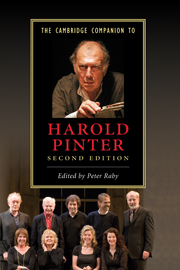Book contents
- Frontmatter
- Introduction
- Part I Text and Context
- 1 Pinter, politics and postmodernism (1)
- 2 Pinter and the 1950s
- 3 The sacred joke: comedy and politics in Pinter’s early plays
- 4 Tales of the city: some places and voices in Pinter’s plays
- 5 Pinter and twentieth-century drama
- 6 Harold Pinter, screenwriter: an overview
- 7 Speaking out: Harold Pinter and freedom of expression
- Part II Pinter and Performance
- Part III Reactions to Pinter
- Bibliography
- Main Index
- Works Index
- Series List
2 - Pinter and the 1950s
from Part I - Text and Context
Published online by Cambridge University Press: 28 November 2009
- Frontmatter
- Introduction
- Part I Text and Context
- 1 Pinter, politics and postmodernism (1)
- 2 Pinter and the 1950s
- 3 The sacred joke: comedy and politics in Pinter’s early plays
- 4 Tales of the city: some places and voices in Pinter’s plays
- 5 Pinter and twentieth-century drama
- 6 Harold Pinter, screenwriter: an overview
- 7 Speaking out: Harold Pinter and freedom of expression
- Part II Pinter and Performance
- Part III Reactions to Pinter
- Bibliography
- Main Index
- Works Index
- Series List
Summary
What did the actor David Baron prefer to read when he came off the stage at the Palace Court Theatre, Bournemouth, in 1956 after an evening playing Mr Rochester in an adaptation of Jane Eyre? Where did he turn for intellectual stimulus during that long season at the Pavilion Theatre, Torquay, in the same year when he played, among some thirteen roles in all, minor characters in Coward and Colette? What confirmed, what disturbed, his view of the state of English drama when, two years later, at the Intimate Theatre, Palmers Green, he coupled routine detective roles with Cliff in Look Back in Anger? Allowing that nothing could be as pressing as the cricket scores, we do know that he turned to Kafka, Yeats and Beckett because their presence is palpable in the subsequent plays of his alter ego, Harold Pinter. We might assume that, as a professional, Pinter/Baron would have turned to the trade journals, probably to The Stage, and it is a reasonable guess that, as an intellectual, he would have read Encore, founded in 1954, the foremost radical theatre journal of the time. Even if he had already determined to go his own way, showing the lack of interest, sometimes active distaste, for theatre criticism that has characterised his later career, the contributors to Encore themselves certainly studied his plays as soon as they arrived on the scene and, through a series of developing aesthetic assumptions, made powerful sense of them. It is, of course, entirely possible that these Encore critics found in the plays significances of which Pinter himself was completely unaware. Their responses remain important. Current reception theory makes much of the interpretative structures, the habits and the preconceptions, that shape the meanings that are given to texts, arguing that these invariably override any authorial intention.
- Type
- Chapter
- Information
- The Cambridge Companion to Harold Pinter , pp. 27 - 42Publisher: Cambridge University PressPrint publication year: 2009
- 1
- Cited by



